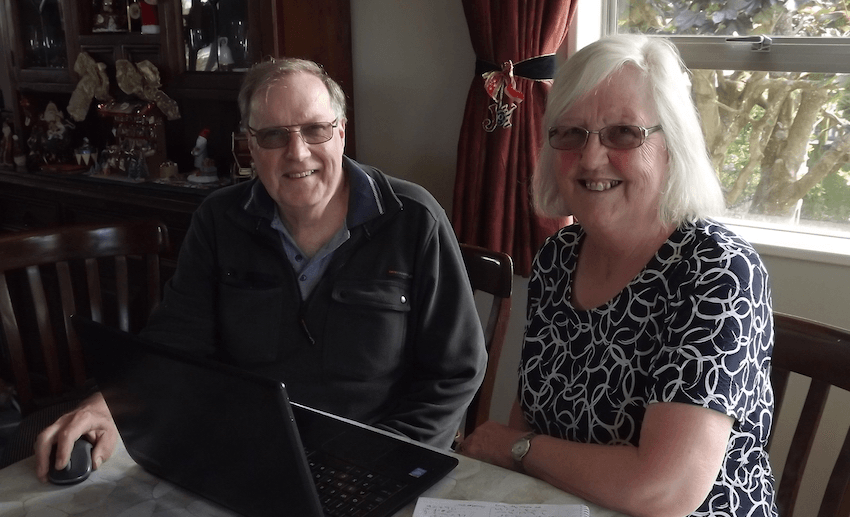David and Anne Clarkson have been reporting on the antics of the Christchurch courthouse for 17 years. They retired in December, and leave behind a legacy of court reporting that will be hard to match.
In my first year as a journalism student I watched the beginning of a murder trial from the media bench of the Christchurch High Court. It was the definition of being thrown in the deep end. A two-week court reporting course culminated in me and a few classmates bearing witness to some truly horrific details of the alleged murder. Despite the case, despite the uncomfortable shoes and court attire, and despite the inability to walk past a police officer without breaking into a sweat for no reason, I made it through that period relatively unscathed.
I have David and Anne Clarkson to thank for that, for providing the kindness we needed to not get overwhelmed, and the push we needed to do our jobs. Now the veteran reporters have hung up their spurs after 17 years of helping students and news publications get Christchurch court stories right.
Their Court News service provided information to newsrooms across the country about what was going on in the Christchurch court system. Alongside work for The Press, the pair would write and send out to subscribers weekly ‘handbooks’, detailed accounts of all the major cases going through the Christchurch courtrooms. David is proud of how useful these handbooks have been to news organisations outside of the city.
“It goes out to them every Sunday morning and it’s up to date because it keeps being updated. I think some of [the newsrooms] are a bit worried about what’s going to happen when that stops arriving in their inbox. Without Anne and I here they’re going to have to do an awful lot of leg work chasing up things around here which take a lot of time and effort.”
The 17 years that David has spent reporting from court is only the latest era of a journalism career that spanned 50 years. There aren’t many other journalists who have stuck around long enough to see the mediums through which the news is consumed change so much. When David started working for a small newspaper in 1969, the process of writing, printing and distributing news was very different.
“[At that time] newspapers were being set in metal type on printing presses downstairs. It was a good while before computers started to be introduced into that process, and then a long time after that when journalists became able to use the computers themselves. It was about 30 years before the internet came about that I started [in journalism].”
During his time working from court David has witnessed some of the most horrific criminal cases in recent New Zealand history. But the one that sticks clearest in David’s mind happened before Court News was born: the “tremendously dramatic” gang-related murder of 25-year-old Max Shannon in 2000.
“Max Shannon was a gang member killed in a drive-by shooting by a rival gang. The trial went on for about six weeks and we covered it day by day and it was absolutely full of drama: mysterious things happening and word of a second shooter lurking in the shadows.”
In 17 years reporting from the Christchurch courthouse, the pair never found the work tedious.
“We tell people when they ask that we find the place more interesting than Shortland Street, because there’s always more interesting new issues that come up and new insights that you see every day. Working at court certainly gives you a new perspective on life. I’ve done all sorts of journalism but I think this is the most interesting to me.”
For the past few years David and Anne have taken journalism classes from the University of Canterbury and the New Zealand Broadcasting School through the court reporting process. Cramming 25 eager students into the public gallery of a small courtroom to watch an hour of minor traffic offences and robbery sentencings can be a logistical nightmare. But David says he and Anne appreciated the youthful energy of the aspiring journalists.
“[The students] bring something new to the building here, and that’s been brilliant… I really enjoyed doing that, and Anne has enjoyed having the students along as well.”
But whether shepherding students or reporting on grisly murders, a certain amount of stress has been an occupational hazard. David admits court reporting is not a job for the fainthearted.
“We need to be careful to not get too invested in it, because if you took it all to heart, some of the dramas and tragedies you see around here, I don’t think you’d last two weeks, really.”
David and Anne’s retirement and the resulting closure of Court News are big losses for New Zealand newsrooms. Now it’ll be up to a new team of reporters to figure out the workings of the Christchurch court. To help them, David has some advice: “You’ll need to track cases through their various stages, talk to people here and look through the paperwork so you know what’s going to be interesting and what’s not.
“Keep your own diary and keep track of it very intensely and make sure that when things get remanded to a new date that you turn up for that and find out what’s happening next. The place can blindside you all the time if you’re not going to take it seriously.”
And for the others wanting to make their way into the ever-changing landscape of media and journalism, he suggests only two things. “One: Be organised. Be very organised. And two: Fill your reports with people and you’ll never go wrong.”

